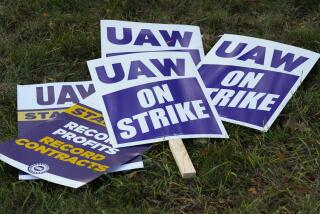June Industrial Output Rate Falls Sharply
- Share via
WASHINGTON — Industrial output tumbled in June at the sharpest rate in more than five years, the Federal Reserve Board said Thursday, as the impact of a bitter strike at General Motors Corp. seeped through the economy.
Added to a deepening Asian crisis and bulging stocks of unsold goods, analysts said the GM strike will slash U.S. economic expansion in the second quarter to a fraction of its booming 5.4% annual rate in the first quarter.
Total production by the nation’s factories, mines and utilities plunged a steeper-than-expected 0.6% in June in a sharp reversal following a 0.3% May rise. It was the steepest decline in monthly output since a matching 0.6% drop in May 1993.
The Fed attributed the decline to the troubles at GM, which remains deadlocked after six weeks of negotiations with the United Auto Workers union.
The nation’s No. 1 auto maker has shuttered 26 of its 29 North American plants and idled more than 184,000 employees.
The strike’s effect on initial claims for unemployment compensation, meanwhile, waned last week, the Labor Department said.
Initial jobless claims fell 58,000 to a seasonally adjusted 336,000 for the week ended July 11, a week that “showed no obvious impact from the strike,” the department said in its weekly report. The data have been skewed for weeks by the strike.
The four-week moving average, which economists say provides a clearer picture of the jobless trend, rose to 372,500 from 371,250 in the previous four-week period and is the highest since 377,250 in the Feb. 17, 1996, week.
In its report, the Fed said June industrial output excluding cars and parts was unchanged after a 0.2% May rise.
Assembly rates for all types of motor vehicles slipped to an annual rate of 10.4 million in June from 12.4 million in May.
Much of the GM strike impact is expected to be temporary, but other, longer-term influences also are putting a drag on U.S. industry and making a summer slowdown a certainty.
“The main factors in the growth slowdown are the selling off of excess inventories and the deepening recession in Asia,” said Jerry Jasinowski, president of the National Assn. of Manufacturers.
Jasinowski said a “longer and deeper” Asian economic crisis will slow exports to the region throughout 1988 and 1999 while overstocked inventories from the first quarter will restrain production until the end of this year.
The government previously reported that companies added to inventories at a record $106-billion-a-year pace in the first three months this year. That has begun to weaken manufacturing activity, as indicated in another report Thursday.
The Federal Reserve Bank of Philadelphia said its business conditions index fell to 11.6 in July from 28.2 in June as new orders, shipments and hiring slowed and corporate chiefs showed signs of worry about the future.
(BEGIN TEXT OF INFOBOX / INFOGRAPHIC)
Industrial Production
Index, 1992=100; seasonally adjusted:
June: 128.1
Source: Federal Reserve Board
More to Read
Inside the business of entertainment
The Wide Shot brings you news, analysis and insights on everything from streaming wars to production — and what it all means for the future.
You may occasionally receive promotional content from the Los Angeles Times.










